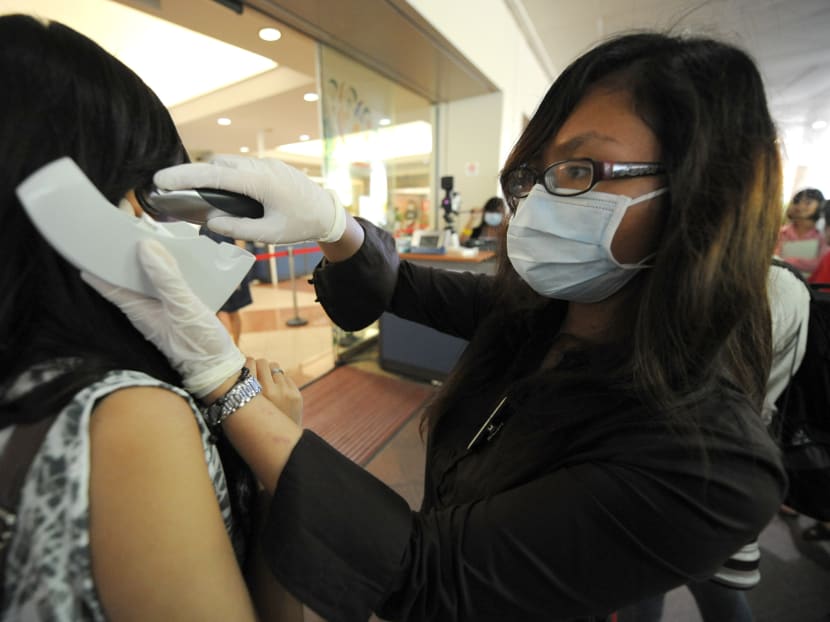Fears of mutant flu strain in HK spark concern here
SINGAPORE — On Monday (July 24), Madam Gan Shu Wen was shocked to find her four-year-old’s kindergarten class of 20 reduced to just five. Tuesday came and, still, only five were in class. On Wednesday, barely half of the class was there.
SINGAPORE — On Monday (July 24), Madam Gan Shu Wen was shocked to find her four-year-old’s kindergarten class of 20 reduced to just five. The next day came and, still, only five attended class. On Wednesday, barely half of the class were there.
After checking with the teacher, the 36-year-old freelance writer learnt that many of the students were down with fever and flu.
Meanwhile, general practitioners contacted by TODAY said they have been treating more flu patients.
At Killiney Medical Clinic, for example, Dr Clarence Yeo said he noticed a 10 per cent to 20 per cent increase in the number of serious flu cases this month.
Dr Yik Keng Yeong, who practises at Tan & Yik Clinic & Surgery in Bishan, is seeing more serious cases of flu over the past week. One unusual case was a girl who was at his clinic on Thursday — she had the flu, and her fever had persisted for nine days.
When contacted, a Tan Tock Seng Hospital spokesman said the hospital saw an increase in the number of influenza cases from May to last month, but the numbers started falling this month.
In the latest weekly infectious disease bulletin issued by the Ministry of Health (MOH), the cases of acute respiratory infection seen in polyclinics here had gone up from about 2,500 daily in the week of July 9 to about 3,300 daily in the week of July 16, although the figures are comparable to last year’s.
Responding to TODAY’s queries, MOH said the uptick in the number of seasonal influenza cases here from April to this month is consistent with the trends observed in the past years. An increase in influenza cases is typically observed between April and July, and from November to January, coinciding with the winter influenza seasons in the Southern and Northern hemispheres respectively.
Currently, there is an unusually lengthy flu outbreak in Hong Kong that has killed more than 200 people since May, as well as an H1N1 outbreak in Myanmar that has killed six.
On whether the overseas developments were a concern, the MOH said there is “no evidence” of any emerging virulent strain of influenza virus circulating in Singapore. The three common circulating influenza viruses in Singapore have remained the same: H3N2, H1N1 and Influenza B.
Nevertheless, the ministry said it will continue to closely monitor the regional influenza situation.
However, Mount Elizabeth Novena Specialist Centre infectious disease specialist Leong Hoe Nam felt that the development in Hong Kong is a cause for concern.
This is because H3N2, the influenza strain reportedly killing people there, is the same one that is predominantly circulating in Singapore. What is more worrying to him is that the strain might have mutated.
“Historically, all the H3N2 mutations come from Hong Kong or South China. And they occur every few years … Everything hinges on the Hong Kong scientists to confirm or refute the presence of a new mutated virus,” Dr Leong said, adding that in cities where people live in close proximity, there could be “an unprecedented
spread of a new novel virus”. A mutation might mean that the available H3N2 vaccine would no longer work, he added.
Adjunct Assistant Professor Angela Chow, head of the department of clinical epidemiology at Tan Tock Seng Hospital, said the Singapore population’s level of immunity is “likely to be low”, given that the influenza vaccination uptake rate in the country is low.
Agreeing, Dr Leong noted that the vaccine uptake is “consistently at less than 10 per cent”.
“Coupled with the fact that this (H3N2) vaccine is not particularly effective (at about 30 per cent to 40 per cent effectiveness), the herd immunity falls further, and more people will be prone to it,” he said.
He recommended that people who are at risk should get vaccinated: Those whose immunity is compromised, including diabetics, those with kidney failure and transplants, and those taking immuno-suppressing drugs such as steroids, as well as young children and the elderly. People in close proximity to this higher-risk group should also be vaccinated.
Dr Chow added that adults and children with chronic medical conditions, pregnant women, and residents of intermediate- and long-term care facilities, should also be vaccinated.
Pointing out that influenza spreads “like wildfire”, Dr Leong observed that many Singaporeans seem to be “oblivious” to the fact that they have the virus. He said: “The misnomer in South-east Asia is that flu means a runny nose, but that occurs in just
15 per cent of the sick. (When it is flu), 60 per cent of those infected will have a cough or sore throat, and 30 per cent to 40 per cent will have no upper respiratory tract symptoms — they will just have fever, headache and muscle ache.”
For working adults, Dr Yik’s advice is for them to “take more than two days of leave” when they come down with a bad flu, because the anti-viral medicine takes days to kick in to curb the spread of the illness.









